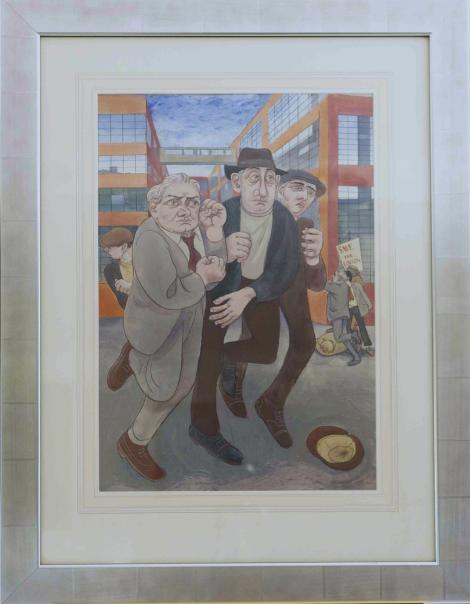Save the Union

Save the Union
Watercolour - Signed dated and inscribed
Image Area: 22ins x 15ins - Framed: 25ins x 32ins
Suggested Offer: £3,750
There was a lot of unrest during the summer of 1955 when Norman painted this work. There was a crippling strike by the Dockers which the Prime Minister suggested was causing considerably more damage to the UK economy that the unrest of the railway workers.
The painting is interesting in that Norman was a Conservative as was the government at the time so it is no surprise that the Unions called for all out strikes. Norman is suggesting here that maybe this is not so much about workers rights or wages but is more about the differences between political persuasions
A transcript is shown below of the discussions between the Minister of Labour and the Unions.
The Minister of Labour said that, in the course of the meeting which he had held on the previous afternoon with representatives of the Transport Commission and of the Associated Society of Locomotive Engineers and Firemen (A.S.L.E.F.), the Chairman of the Transport Commission had suggested that a referee should be appointed by the Minister to determine the pay increases to be given to drivers and motormen, that both the Unions concerned should agree in advance to accept the referee's decision and that the strike notices should be withdrawn as soon as the referee's decision was made known. It was an essential part of this suggestion that the National Union of Railwaymen (N.U.R.) should concur in the procedure proposed and should be entitled to give evidence to the referee. This suggestion had not yet been accepted by A.S.L.E.F., who were likely to press the point that the referee should also be empowered to determine a pay increase for top-grade firemen; but they had shown themselves sufficiently interested in the suggestion to warrant consultation with the N.U.R., who had been summoned to the Ministry of Labour and informed of it late on the previous evening. Further meetings to consider it were being held that morning by the N.U.R. and by the Transport Commission and A.S.L.E.F.; and, if these discussions went well, the Minister himself would hold a joint meeting later in the morning with representatives of the Transport Commission and of the two Unions.
The Minister said that he had not known in advance that the Chairman of the Transport Commission intended to suggest that the strike should not be called off until the referee's decision was made known. This was an unfortunate feature of the plan, since it would appear to concede A.S.L.E.F's claim that they must receive satisfaction in terms of a cash figure before calling off the strike. On the other hand they would have undertaken, before the referee's decision was made known, to call off the strike; there would be no formal negotiations between the parties while the strike continued; and a great deal would be left for negotiation after the strike had been called off. If, however, the two Unions accepted this suggestion in principle, the Minister proposed to make a strong appeal to A.S.L.E.F. to call off the strike at once instead of waiting until the referee's award was made known.
In discussion there was general support for the view that, if this procedure were adopted, A.S.L.E.F. should be strongly pressed to call off the strike as soon as the referee was appointed. It might be possible to secure this by conceding that the referee should be empowered to deal with the pay of top-grade firemen, as well as that of drivers and motormen. By this offer and other means the Minister of Labour should do his utmost to persuade A.S.L.E.F. to call off the strike instead of waiting until the referee's decision was made known.
In further discussion the point was made that the economic consequences of the railway strike would become progressively more serious if it continued beyond the end of the present week. There was in particular reason to fear that, if the strike continued much longer, it might be difficult to restrain miners in some coalfields from stopping work
